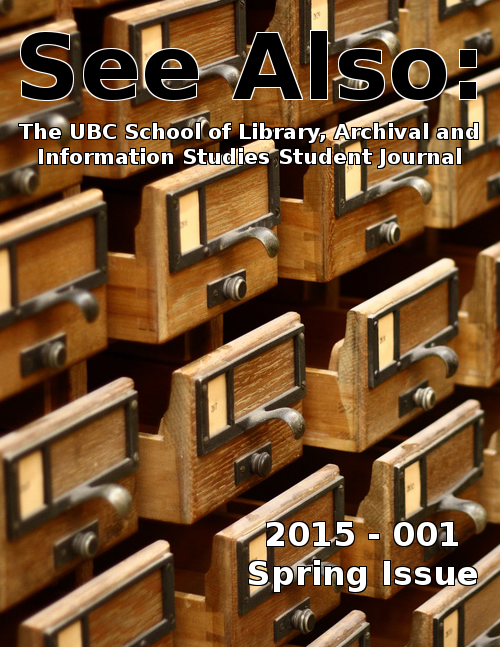Let's Talk About the Environment: A Content Analysis of the EcoKids Discussion Forum
DOI:
https://doi.org/10.14288/sa.v1i1.186361Abstract
The discussion forum on a popular environmental website for children, EcoKids.ca, underwent a content analysis. The researcher looked at how children utilized the forum and searched for common themes. She found that very little interpersonal interaction occurred on the site, but that the users appeared engaged with both the site and the topic of environmentalism. The children's understandings of the environmental problems faced by the world were generally simplistic and did not necessarily represent the most pressing issues identified by environmentalists.
References
About Us. (n.d.). Retrieved 12 October 2014, from http://www.ecokids.ca/pub/about_us/index.cfm
About Us: Awards. (n.d.). Retrieved 13 October 2014, from http://www.ecokids.ca/pub/about_us/awards.cfm
Adelman, D. S., & Nogueras, D. J. (2013). Discussion Boards: Boring No More! Nurse Educator January/February 2013, 38(1), 30–33. http://doi.org/10.1097/NNE.0b013e318276df77
Alghamdi, A. (2013). Pedagogical Implications of Using Discussion Board to Improve Student Learning in Higher Education. Higher Education Studies, 3(5), 68–80.
Blackwell, C. K., Lauricella, A. R., Conway, A., & Wartella, E. (2014). Children and the Internet: Developmental Implications of Web Site Preferences Among 8- to 12-Year-Old Children. Journal of Broadcasting & Electronic Media, 58(1), 1–20. http://doi.org/10.1080/08838151.2013.875022
Cheung, W., Hew, K., & Ling Ng, C. (2008). Toward an Understanding of Why Students Contribute in Asynchronous Online Discussions. Journal of Educational Computing Research, 38(1), 29–50. http://doi.org/10.2190/EC.38.1.b
Dengler, M. (2008). Classroom Active Learning Complemented by an Online Discussion Forum to Teach Sustainability. Journal of Geography in Higher Education, 32(3), 481–494. http://doi.org/10.1080/03098260701514108
EcoKids.ca - Website Review. (n.d.). Retrieved 3 December 2014, from https://www.commonsensemedia.org/website-reviews/ecokidsca
Enriquez, J. G. (2009). Discontent with content analysis of online transcripts. ALT-J, 17(2), 101–113. http://doi.org/10.1080/09687760903033066
Fichman, P. (2011). A comparative assessment of answer quality on four question answering sites. Journal of Information Science, 37(5), 476–486. http://doi.org/10.1177/0165551511415584
Have Your Say: About/Privacy. (n.d.). Retrieved 13 October 2014, from http://www.ecokids.ca/pub/have_your_say/about.cfm
Hrastinski, S. (2009). A theory of online learning as online participation. Computers & Education, 52(1), 78–82. http://doi.org/10.1016/j.compedu.2008.06.009
Kim, S. (2010). Questioners’ credibility judgments of answers in a social questions and answers site. Information Research, 15(2), Paper 432.
Liu, E. Z.-F., Cheng, S.-S., & Lin, C. H. (2013). The Effects of Using Online Q&A Discussion Forums with Different Characteristics as a Learning Resource. The Asia-Pacific Education Researcher, 22(4), 667–675. http://doi.org/10.1007/s40299-013-0072-2
Rideout, V. M., Foehr, U. G., & Roberts, D. F. (2010). Generation M2: Media in the Lives of 8- to 18-Year-Olds (p. 85). Menlo Park, CA: Henry J. Kaiser Family Foundation. Retrieved from http://kaiserfamilyfoundation.files.wordpress.com/2013/01/8010.pdf
Riley, N. R. (2006). Methods for evaluating critical learning using online discussion forums. Technology, Pedagogy and Education, 15(1), 63–78. http://doi.org/10.1080/14759390500435770
Downloads
Published
Issue
Section
License
All authors in See Also retrain full copyright of their material.
All content in See Also is published under an Attribution-NonCommercial-NoDerivatives 4.0 license.
Under this license you are free to:
Share — copy and redistribute the material in any medium or format
Under the following terms:
Attribution — You must give appropriate credit, provide a link to the license, and indicate if changes were made. You may do so in any reasonable manner, but not in any way that suggests the licensor endorses you or your use.
NonCommercial — You may not use the material for commercial purposes.
NoDerivatives — If you remix, transform, or build upon the material, you may not distribute the modified material.
- No additional restrictions — You may not apply legal terms or technological measures that legally restrict others from doing anything the license permits.

